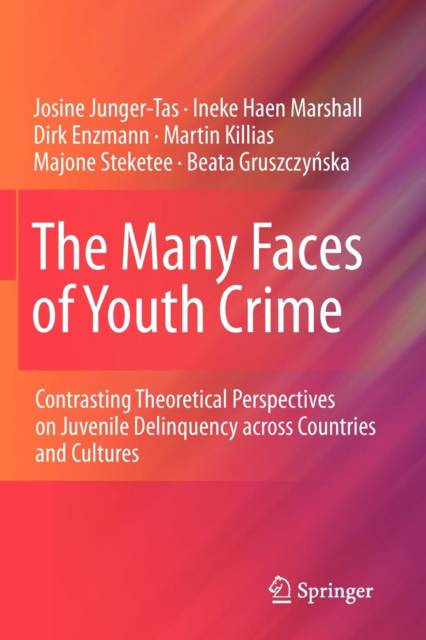
- Afhalen na 1 uur in een winkel met voorraad
- Gratis thuislevering in België vanaf € 30
- Ruim aanbod met 7 miljoen producten
- Afhalen na 1 uur in een winkel met voorraad
- Gratis thuislevering in België vanaf € 30
- Ruim aanbod met 7 miljoen producten
Zoeken
The Many Faces of Youth Crime
Contrasting Theoretical Perspectives on Juvenile Delinquency Across Countries and Cultures
Josine Junger-Tas, Ineke Haen Marshall, Dirk Enzmann, Martin Killias, Majone Steketee, Beata Gruszczynska
Paperback | Engels
€ 83,95
+ 167 punten
Uitvoering
Omschrijving
This book presents the first comprehensive analysis of the second International Self-Report Delinquency study (ISRD-2). An earlier volume, Juvenile Delinquency in Europe and Beyond (Springer, 2010) focused mainly on the findings with regard to delinquency, victimization and substance use in each of the individual participating ISRD-2 countries. The Many Faces of Youth Crime is based on analysis of the merged data set and has a number of unique features: The analyses are based on an unusually large number of respondents (about 67,000 7th, 8th and 9th graders) collected by researchers from 31 countries; It includes reports on the characteristics, experiences and behaviour of first and second generation migrant youth from a variety of cultures; It is one of the first large-scale international studies asking 12-16 year olds about their victimization experiences (bullying, assault, robbery, theft); It describes both intriguing differences between young people from different countries and country clusters in the nature and extent of delinquency, victimization and substance use, as well as remarkable cross-national uniformities in delinquency, victimization, and substance use patterns; A careful comparative analysis of the social responses to offending and victimization adds to our limited knowledge on this important issue; Detailed chapters on the family, school, neighbourhood, lifestyle and peers provide a rich comparative description of these institutions and their impact on delinquency; It tests a number of theoretical perspectives (social control, self-control, social disorganization, routine activities/opportunity theory) on a large international sample from a variety of national contexts; It combines a theoretical focus with a thoughtful consideration of the policy implications of the findings; An extensive discussion of the ISRD methodology of 'flexible standardization' details the challenges of comparative research. The bookconsists of 12 chapters, which also may be read individually by those interested in particular special topics (for instance, the last chapter should be of special interest to policy makers). The material is presented in such a way that it is accessible to more advanced students, researchers and scholars in a variety of fields, such as criminology, sociology, deviance, social work, comparative methodology, youth studies, substance use studies, and victimology.
Specificaties
Betrokkenen
- Auteur(s):
- Uitgeverij:
Inhoud
- Aantal bladzijden:
- 367
- Taal:
- Engels
Eigenschappen
- Productcode (EAN):
- 9781461458401
- Verschijningsdatum:
- 21/09/2012
- Uitvoering:
- Paperback
- Formaat:
- Trade paperback (VS)
- Afmetingen:
- 156 mm x 234 mm
- Gewicht:
- 535 g

Alleen bij Standaard Boekhandel
+ 167 punten op je klantenkaart van Standaard Boekhandel
Beoordelingen
We publiceren alleen reviews die voldoen aan de voorwaarden voor reviews. Bekijk onze voorwaarden voor reviews.











